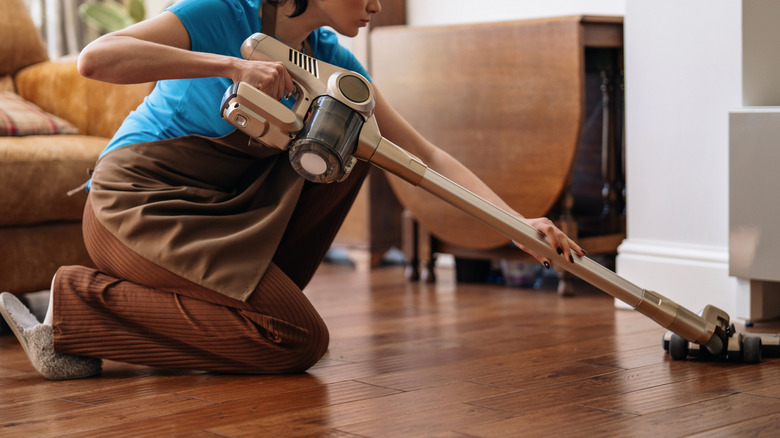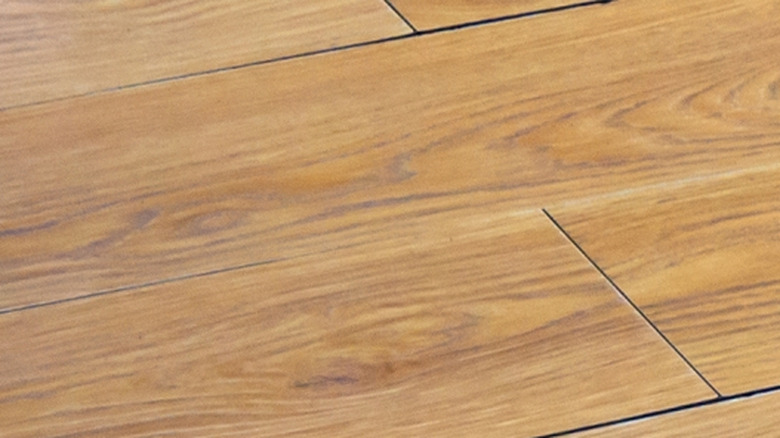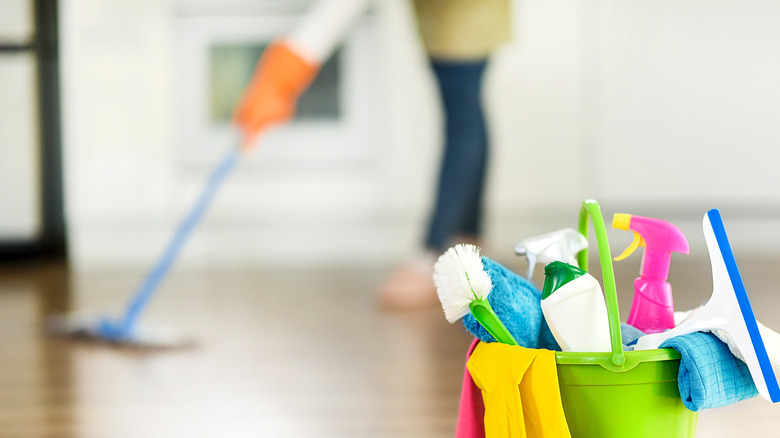Avoid Cleaning Your Wood Floors With This Type Of Vinegar
We may receive a commission on purchases made from links.
With the plethora of cleaning hacks that call for apple cider vinegar, it's understandable to mistakenly consider it a go-to for washing every part of your home. After all, the more you can use something like apple cider vinegar, the more money you can save on non-toxic and environmentally friendly ways to get your surfaces to shine. But even though it's a superstar cleaning ingredient for windows, walls, bathroom tiles, and more, you'll want to avoid cleaning wood floors with apple cider vinegar because it's too acidic and can eat away at the wood's finish. Whether it's store-bought or from the pantry, make sure you opt for a floor cleaner with a neutral pH instead.
If you have wood floors, protecting the finish is how you keep them from losing their luster, and mopping with any type of vinegar — even when diluted with water — can compromise that finish. Apple cider vinegar has between 5% and 6% acetic acid, so the same property that makes it a great stain fighter in other areas of the home poses a risk to the floors' much-needed finish. Diluting the vinegar with water and mopping with the mix actually compounds the problem, since the wood can absorb the moisture and expand, leading to further damage.
Wood floors and apple cider vinegar don't mix
An acidic cleaner like apple cider vinegar is the last thing you want near finished wood floors. This may seem contradictory to passed-down advice, as vinegar used to be a cleaner of choice for old hardwood floors before applying a wax to them, but changes in floor production made that method unnecessary and even harmful. Over time, the vinegar and the water it's often mixed with can cause streaking in modern wood floors. If the routine continues, the wood can crack and the finish can start to peel away from the wood. Even if you avoid the worst damage by keeping vinegar cleaning to a minimum, it can still give your wood floors a lackluster, cloudy look. Apple cider vinegar, as compared to white vinegar, may also add a more of a stickiness to the floor after cleaning with it.
If you have identified what type of wood your flooring is made of and found out it's a laminate that contains no wood at all, professionals still urge caution. These types of floors also have finishes that can be compromised or dulled by the acid in vinegar. Whether you're sure you have real wood or know it's laminate, it's best to be safe by avoiding apple cider vinegar and keeping the cleaning process as dry as possible, utilizing a pH-neutral cleaner in a spray bottle and a flat mop made of microfiber.
Apple cider vinegar alternatives for wood floors
Instead of reaching for the apple cider vinegar, avoid future headaches by cleaning your wood floors with a pH-neutral cleaning solution. Bona Hardwood Floor Cleaner is a popular choice that's formulated specifically for finished wood. When searching for the right cleaner, pay special attention to the wording on labels, since there are differences between neutral floor cleaners and floor neutralizers. Most likely, you will be looking for a neutral floor cleaner, which is a gentle product for everyday use, and not a floor neutralizer, unless you need to attack stains from snow and rock salt tracked in during the winter.
It's not strictly necessary to give up the idea of using a household ingredient if you're watching the budget or just want to stick with natural cleaners. You can try a simple combination of water and dish soap for a wood-friendly cleaning solution. Others have had success combining rubbing alcohol, which has a neutral pH, with water and dish soap, or mixing water and castile soap in a spray bottle. Whatever you use to clean hardwood floors, though, make sure not to oversaturate the mop and floor with too much water, which can cause the wood to swell.


